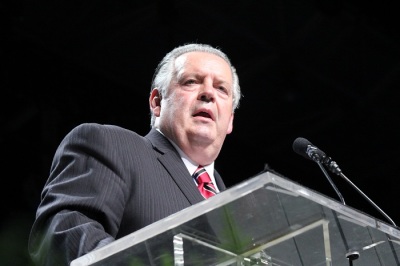Ask Dr. Land: Why are Americans so lonely?
Question: Is America suffering from a loneliness pandemic?

The COVID-19 pandemic has both revealed and underscored underlying fault lines and fissures in American society. The pandemic’s impact has been exacerbated by the fact that Americans are living in a society tormented by unprecedented levels of loneliness.
Dr. Vivek Murthy, Surgeon General of the United States from 2014-2017, has written a new book, Together: The Healing Power of Human Connection in a Sometimes Lonely World. Dr. Murthy, the “nation’s doctor,” was stunned to discover just how desperately “lonely” and “isolated” large numbers of Americans felt. Dr. Murthy began his tenure as Surgeon General by embarking on a nationwide fact-finding listening tour. He found the results of his research very unsettling. The issue that most resonated prevalently among the American population was a crippling sense of emotional isolation, even in densely populated urban areas.
Why would this be? One major reason is the breakdown of the “mediating” institutions in American society — the family, the church, social service organizations, etc. For instance, American adults are living alone now more than ever before in our history. The nation was forewarned about these alarming developments and the dire consequences that would ensue unless drastic action was taken. In 2003 the Commission on Children at Risk issued a report (Hardwired to Connect: The New Scientific Case for Authoritative Communities, A Report to the Nation from the Commission on Children at Risk, sponsored by the YMCA of the USA, Dartmouth Medical School and the Institute for American Values [New York: Institute for American Values, 2003].)
This report addressed the then burgeoning “connection crisis.” The report presented extensive scientific evidence that the human brain is hard-wired for two fundamental kinds of connections: horizontally in close relationship with other human beings and vertically in finding moral and spiritual meaning through a relationship with a transcendent divine being. The report went on to warn that if American society continued to ignore this “hard-wiring” in human brains, the consequences would be dire.
We are now witnessing a generation later the consequences on the adults those then adolescents have now become. This prevailing sense of loneliness is greatly exacerbated by the ubiquitous presence of the internet. People are seeking the human social connections their psyches crave online, and that is akin to seeking to substitute cotton candy for a nutritious diet — it may taste good and momentarily satisfy your hunger, but you end up with severe emotional malnutrition.
Christians should not be surprised by these disturbing developments. God reveals to us in Holy Scripture that He created us as “social” beings — created for vertical fellowship with Him and horizontal relationship with each other. At the very beginning, even before the calamitous impact of the Fall on human nature and the creation itself, God declared, “It is not good that man should be alone” (Gen. 2:18).
Adam and Eve’s sin disrupted their fellowship with God and distorted, twisted, and warped their relationship with each other. Holy Scripture teaches us that the only way we can find the inner peace and serenity we all seek is to find forgiveness, redemption, and restoration through faith in the Lord Jesus Christ.
Even then, after establishing that vertical relationship with our Creator, having been born again from above by faith and trust in Jesus as our Savior (John 3:1-21), Christians are commended “not forsaking the assembling of ourselves together, as the manner of some is, but exhorting one another” (Heb. 10:25).
Once Christians are in vertical relationship with their Heavenly Father, they are baptized by the Holy Spirit into the body of Christ (Rom. 12:5). This biblical metaphor for the church describes the New Testament church not as a social organization, but rather as a living, breathing entity composed of organic interdependent parts and gifts that are sovereignly bestowed by the Holy Spirit to each local assembly through individually gifted believers.
The best inoculation against the besetting loneliness and sense of isolation impacting ever greater numbers of Americans, exacerbated and exposed by the “pandemic lockdowns,” is a vertical spiritual relationship with the Lord Jesus, which then makes possible the horizontal relationship with brothers and sisters in Christ.
For the newly churched, the re-churched, and the already churched, Christians must emphasize to all who will hear that none of us are going to become all that God created us to be in this life apart from regular worship and interactive fellowship with other believers. None of us can fully embrace the breadth, plumb the depth, or scale the height of God’s ultimate will, purpose, and plan for each of our lives without other believers ministering to us the spiritual gifts God has given each of them as we minister to them the spiritual gifts God has bestowed upon each of us in joint worship and fellowship.
Our Heavenly Father has not left us alone. He resurrects us from spiritual death to spiritual life (Eph. 2:1-3). He then purposes and desires to place us in fellowship with other pilgrim souls so that we complete our spiritual journey in the company of our new, extended Christian family, born-again from above, connected by the Holy Spirit through the blood of Jesus, our Savior and Lord.
Dr. Richard Land, BA (magna cum laude), Princeton; D.Phil. Oxford; and Th.M., New Orleans Baptist Theological Seminary, was president of the Southern Baptists’ Ethics & Religious Liberty Commission (1988-2013) and has served since 2013 as president of Southern Evangelical Seminary in Charlotte, NC. Dr. Land has been teaching, writing, and speaking on moral and ethical issues for the last half century in addition to pastoring several churches.



























